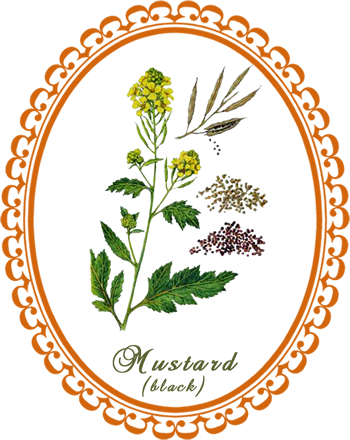
Mustard: due to the ability of the seeds to stimulate circulation, they were used to treat coldness of the body and added to love potions ...
Common Names: Mustard
Botanical Name: Brassica nigra (Black Mustard), Brassica alba (Mustard)
Family: Brassicaceae
Plant Type: Hardy annual
Parts Used: Leaves and seeds
Flowering: Spring
Black mustard is native to Europe, Africa, Asia, and the Americas.
Description: The whole large mustard family can be recognized by the four petals of the blossoms, arranged in the form of a cross. Narrowing at its base, each petal is broadly flat at the top. Half a dozen tiny, lean stamens carry the pollen. In the middle of each flower, hidden until the petals and stamens fall away, is a singular, green, seed-bearing concavity. It then expands into an elongated, thin pod that is filled with tiny, deeply colored, pungent seeds, dozens of these peppery fruits lifting alone from the stalks. The pods mature during the warm summer months.
Cultivation: Mustard is a hardy annual, growing readily just about anywhere, but does best in dry weather. It reseeds freely.
Harvesting: Collect the seeds in late summer. Harvest young mustard leaves for culinary uses; older leaves are too pungent.
Culinary Uses: Use the tender young leaves as a tangy addition to salads. Use the seeds to flavor pickles or chutney, or grind them to make mustard.
Black Mustard Magick
Fertility. Protection. Mental Powers.
Gender: Masculine
Planet: Mars
Element: Fire
When eaten, mustard seed increases fertility in women.
Sprinkle mustard seed on your doorstep to protect your home.
Carry some in a red cloth bag to keep you from getting a cold and to increase mental powers.
Herbal Healing with Black Mustard
Medicinal Actions: Antirheumatic, antiseptic, aperitive, diuretic, emetic, febrifuge, laxative, stimulant (salivary glands), tonic
Medicinal Uses: The best-known use for the seeds from this herb are as a poultice, applied on the skin wherever there is pain in the muscles or joints. Mustard plasters, applied on the chest, have long been relied upon to relieve congestion through their heat. Mustard is mildly irritating to the skin, bringing a flush of blood to the area, which stimulates the circulation and relieves inflammation. Taken internally, mustard stimulates the appetite and aids digestion, however, large doses can cause vomiting. In a medicinal dose, mustard brings on a sweat, helping the body to deal with a fever, colds, influenza and bronchitis.
Caution: Black mustard is a strong irritant and can blister when applied directly on the skin.
Healing Combinations with Mustard
- Combine mustard with the soothing herbs comfrey (Symphytum), and slippery elm (Ulmus fulva)
- Combine mustard with warming, anti-inflammatory herbs like juniper (Juniperus communis) or lavender (Lavendula officinalis)
Mustard Poultice: Mix 3 1/2 oz of fresh ground seed with warm water to form a thick paste, and spread it over a piece of cloth, Put gauze over the affected area to prevent the poultice from sticking to the skin, and lay the poultice on top. Leave it in place for about a minute.
If you appreciate the information provided,
please help keep this website running. Blessings!
© 2008-2025 aromaworx.ca. All rights reserved.

